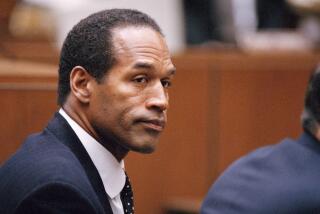Earl Hutchinson Sr., 100; Considered Oldest Black American to Pen Memoirs
Earl Hutchinson Sr., who in his 90s and with the prodding and help of his better-known son, Earl Ofari Hutchinson, wrote his autobiography, “A Colored Man’s Journey Through 20th Century Segregated America,” has died. He was 100.
Hutchinson died Friday in Los Angeles, said his son, a civil rights author and longtime host of “Tuesday Night Live” on KPFK-FM (90.7).
When the memoir was published in 2000, the elder Hutchinson was 96 and, according to Ethnic News Watch and the Los Angeles Sentinel, the oldest black American to write his autobiography.
The book, a Sentinel reviewer noted, was “a compelling saga of one man’s fight for personal dignity.”
President Clinton wrote to Hutchinson, congratulating him on the book and calling him “a strong and dedicated champion of social, economic and political equality.”
“In the era I lived through, we called ourselves ‘colored,’ ” Hutchinson told The Times in 2000. “We were proud of being colored. We turned the word into a badge of pride rather than an emblem of shame. It still is to me.”
Hutchinson, born Dec. 11, 1903, in Clarksville, Tenn., and reared in St. Louis, never marched in a demonstration or otherwise protested the racial discrimination he considered “just the way it was.” He was 61 by the time the Civil Rights Act outlawed segregation in schools, housing and the workplace.
Yet, in his own quiet and determined way, he forged a career in the U.S. Postal Service and then real estate, brought up a family and integrated white neighborhoods.
Perhaps considered passive compared with young black men of today, Hutchinson achieved change simply by the way he lived.
“I’m a colored person,” he told The Times four years ago. “I never felt I was superior. I certainly never felt that I was inferior.”
Moving to St. Louis provided no escape from segregation for Hutchinson’s family. As a boy, he related in his book, he lived near a school, yet had to walk three miles to attend a school for blacks. Despite the heat of Missouri summers, he had to stand outside public swimming pools “and watch Caucasians swim.” When he walked through white neighborhoods, he was beaten by white boys who screamed racial epithets at him.
Nevertheless, Hutchinson refused to become bitter. He graduated from high school at 18 with hopes of becoming a professional musician. But when his grandfather advised him to go to work for the post office, noting that “as long as the government’s going, they’ve got money,” he did so.
At age 23, after five years at the St. Louis post office, he transferred to Chicago.
Without legal recourse over discrimination, but by simply refusing to take no for an answer, he forced the post office to promote him from an invisible back room job to window clerk.
The young bachelor, who prided himself on playing “a mean trombone,” enjoyed the Chicago nightlife as he moonlighted with jazz bands and applauded such entertainers as Louis Armstrong, Duke Ellington, Bill “Bojangles” Robinson, Earl Hines and Pearl Bailey.
In his autobiography, Hutchinson related the tenor of the times, citing heroes who were cheered in black theaters and on radio, such as Olympic athlete Jesse Owens and boxer Joe Louis. The fighter, he said, “was our hero ... he made colored people feel that they were somebody.”
In 1935, Hutchinson married Nina Mae Brown. The couple had a daughter, Earline, and son, Earl Jr. Both Hutchinson’s first wife and his daughter are deceased.
In another daring move, the quiet but determined Hutchinson related in his book, in the late 1940s he bought an apartment in a white Chicago neighborhood and moved his family in. The next day, neighbors put signs in their windows: “Unwanted occupant at 6357 Greenwood must go.” A log was thrown through the Hutchinsons’ window and their fence was trampled, but the family stayed.
Unimpressed with California on an early visit, Hutchinson nevertheless agreed to move to Los Angeles in 1960 to escape Chicago’s bitter winters. He was 56 and retired as a postal employee, but quickly went into real estate and worked seven years as a clerk with the Department of Water and Power.
“When I was in St. Louis,” he summarized his philosophy on identity for The Times in 2000, “I was colored. When I got to Chicago, I was a Negro. When I got to California, I was black. But I’m still brown.
“Someday,” he added, “I hope we would be known as just Americans. I’m asking no more, no less.”
In addition to his son, Hutchinson is survived by his wife, Dorothy K. Hutchinson; three grandchildren; and four great-grandchildren.
A memorial service is scheduled for 11 a.m. Friday at the Holman Methodist Church, 3320 W. Adams Blvd., Los Angeles.
The family has asked that memorial contributions be sent to the National Alliance for Positive Action, 614 E. Manchester Blvd., Suite 204, Inglewood, CA 90301.
More to Read
Sign up for our Book Club newsletter
Get the latest news, events and more from the Los Angeles Times Book Club, and help us get L.A. reading and talking.
You may occasionally receive promotional content from the Los Angeles Times.









